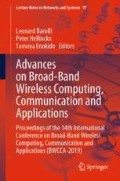Abstract
Dempster-Shafer evidence theory (DSET) is an important tool to combine uncertain and imprecise information from multiple sources. However, when combining information with highly conflict, it will lead counterintuitive results. A lot of research has been done to resolve the problem. In this paper, we focus on the approach to revise the basic probability assignment of information (evidence) through discount factors. Two methods are proposed to computer discount factors by multi-criteria of reliability measurement. Then we combine multi-source information in the improved Dempster’s rule. Finally, some numerical examples are used to illustrate the efficiency of our proposed methods.
Access this chapter
Tax calculation will be finalised at checkout
Purchases are for personal use only
References
Dempster, A.: Upper and lower probabilities induced by multivalued mapping. Annu. Math. Stat. 38(2), 325–339 (1967)
Shafer, G.: A Mathematical Theory of Evidence. Princeton University Press, Princeton (1976)
Zadeh, L.A.: Review of ‘‘a mathematics theory of evidence’’. AI Mag. 5(3), 81–83 (1984)
Dezert, J.: Foundations for a new theory of plausible and paradoxical reasoning. Inf. Secur. 9, 13–57 (2002)
Lefevre, E., Colot, O., Vannoorenberghe, P.: Belief function combination and the conflict management. Inf. Fusion 3(2), 149–162 (2002)
Smets, P.: The combination of evidence in the transferable belief model. IEEE Trans. Pattern Anal. Mach. Intell. 12(5), 447–458 (1990)
Murphy, C.K.: Combining belief functions when evidence conflicts. Decis. Support Syst. 29(1), 1–9 (2000)
Xia, J., Feng, Y., Liu, L., Liu, D., Fei, L.: An evidential reliability indicator-based fusion rule for Dempster-Shafer theory and its applications in classification. IEEE Access 6, 24912–24924 (2018)
Marhic, B., et al.: An evidential approach for detection of abnormal behaviour in the presence of unreliable sensors. Inf. Fusion 13(2), 146–160 (2012)
Huynh, V.-N.: Discounting and combination scheme in evidence theory for dealing with conflict in information fusion. In: MDAI 2009, pp. 217–230 (2009)
Frikha, A.: On the use of a multi-criteria approach for reliability estimation in belief function theory. Inf. Fusion 18, 20–32 (2014)
de Oliveira Silva, L.G., de Almeida Filho, A.T.: A multicriteria approach for analysis of conflicts in evidence theory. Inf. Sci. 346–347, 275–285 (2016)
Sarabi-Jamab, A., Araabi, B.N.: How to decide when the sources of evidence are unreliable: a multi-criteria discounting approach in the Dempster-Shafer theory. Inf. Sci. 448–449, 233–248 (2018)
Yager, R.R.: Entropy and specificity in a mathematical theory of evidence. Classic Works of the Dempster-Shafer Theory of Belief Functions, pp. 291–310 (2008)
Dubois, D., Prade, H.: A note on measures of specificity for fuzzy sets. Int. J. Gen. Syst. 10(4), 279–283 (1985)
Klir, G.J., Parviz, B.: A note on the measure of discord. In: UAI 1992, pp. 138–141 (1992)
Hwang, C.L., Yoon, K.: Multiple Attribute Decision Making. Springer, Berlin (1981)
Jousselme, A.-L., Grenier, D., Bossé, É.: A new distance between two bodies of evidence. Inf. Fusion 2(2), 91–101 (2001)
Martin, A., Jousselme, A.-L., Osswald, C.: Conflict measure for the discounting operation on belief functions. In: FUSION 2008, pp. 1–8 (2008)
Liu, W.: Analyzing the degree of conflict among belief functions. Artif. Intell. 170(11), 909–924 (2006)
Yong, D., Shi, W., Zhu, Z., Qi, L.: Combining belief functions based on distance of evidence. Decis. Support Syst. 38(3), 489–493 (2004)
Author information
Authors and Affiliations
Corresponding author
Editor information
Editors and Affiliations
Rights and permissions
Copyright information
© 2020 Springer Nature Switzerland AG
About this paper
Cite this paper
Zhu, J. (2020). A New Discounting Approach to Conflict Information Fusion Using Multi-criteria of Reliability in Dempster-Shafer Evidence Theory. In: Barolli, L., Hellinckx, P., Enokido, T. (eds) Advances on Broad-Band Wireless Computing, Communication and Applications. BWCCA 2019. Lecture Notes in Networks and Systems, vol 97. Springer, Cham. https://doi.org/10.1007/978-3-030-33506-9_41
Download citation
DOI: https://doi.org/10.1007/978-3-030-33506-9_41
Published:
Publisher Name: Springer, Cham
Print ISBN: 978-3-030-33505-2
Online ISBN: 978-3-030-33506-9
eBook Packages: EngineeringEngineering (R0)

